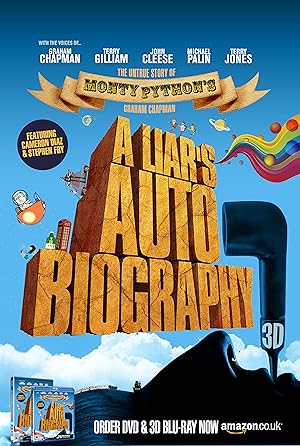
A Liar's Autobiography: The Untrue Story of Monty Python's Graham Chapman Page #2
having three atoms to the molecule.
- What you can smell is rotting seaweed.
- Well, it's good for you.
- No, it isn't.
- Don't argue with your father.
It's those fancy books. You can't learn
everything out of books, my lad.
There's no argument. It's a fact.
Stop it, Graham. Now, come on.
We'll go and get the fish.
- No, we'll stay here.
- I think we should get the fish.
That ship over there
ls bringing wood from Nonuay,
coniferous wood used
in the paper manufacturing industry
since the late 15th century.
But the first paper mill in England
was owned by John Tate in Herlford,
a manufacturer of continuous...
Oh, the Tates. Wasn't their youngest
walking about with that Valerie Maskell?
No.
This process was developed by the
stationers Messrs H and S Fourdrinier.
It was her.
She was the one that got all the spots
at secretarial college.
Quiet, Edith.
The Fourdriniers were assisted by Mr
Bryan Donkin, an inventor and engineer.
Wasn't his step-uncle, Stephanie,
a wholesale poultry in Peatling Parva?
- No!
- Yes, he was.
It was their youngest
that moved downstairs
next door to the chemist in Wimbledon,
nearly opposite the Gantleys.
Shut up.
Do you realise that if you look out there
on a very clear day,
you can't quite see Denmark?
I think we should get the haddock.
Will you shut up
about the bloody haddock?
- Why is it that every bloody year...
- Language.
Every year our summer holiday
consists of two weeks
in Scarborough, Filey or Bridlington,
sitting in a car in the rain, bickering.
- Why don't we go to bloody Denmark?
- Language!
- We did promise haddock.
- Oh, all right!
We'll go and get your bloody, flaming,
bloody haddock!
Trouble with you two is you don't
appreciate the beauties of nature.
What's that you've got back there?
It's a book.
"I, Biggles", by Captain W E Graves.
Captain, eh?
Mm. That sounds better.
Everything OK, skipper?
Tell you what, old man.
Having a bit of trouble with this.
Could you just pop your hand down
my Mae West, old tapir?
Well, if that's an order, old guillemot.
- It is.
- Righty-O.
Here it comes, old bison.
- Don't stop now! I'm nearly there.
- So am I!
- What about me?
- Oh, f*** off, Ginger.
To heck with the lot of them.
I'll just jolly well sit down here
and improve the bally old mind a little,
don't you know.
"The Complete Works
of Captain W E Johns".
"How to speak English
in other languages".
"The Interpretation of Dreams",
by Sigmund Freud.
In the following lecture,
I, Sigmund Freud,
shall prove the entire psychology
of man can only be understood
with a reference
to the science of navigation.
Spot on.
In relation to this,
who was having reoccurring dreams
about flying.
A fictional aviator called Bigglesworth
and his companions
are attempting to escape
from a Focke-Wulf
which is pursuing them
and shooting at them.
A typical dream recall of a particularly
exciting episode
of an adventure story for boys.
Or so it would seem.
Let's look at the dream more closely.
is that throughout the scene
we see navigational elements
hidden not so far below the surface.
A compass, indicating
the plane's direction of travel.
A map behind the aviators
telling them where they are going.
All unmistakable symptoms
of a navigational obsession.
Note also the use
of zoological terminology
in their navigational exchange
with one another.
"Old bison," "old tapir"
and even "old guillemot"
clearly indicates a yearning for a
pre-rational animal state of existence
in which navigation
is not yet distinguishable
The boy patient clearly identifies himself
with the minor character, Ginger,
who is excluded from the adventure
because he is navigationally inadequate.
Ginger? That's me.
Inadequate? What a bally awful tone,
don't you know, what ho, old chap.
- You've been bloody reading again.
- I haven't.
Well, what's this in my hand?
"The Interpretation of Dreams",
by Sigmund Freud,
probably his most original work,
in which he explored the unconscious
and found that neurotic symptoms
are like dreams,
a product of conflict and compromise
between the conscious
and unconscious states...
Is it? What's this?
"Sucking at the mother's breast
"is the starting point
"the unmatched prototype
of every latent sexual satisfaction"?
I've got the haddock.
Now, what were you saying?
Oh, another book, dear?
What is it this time?
Nothing. Just a road map.
Who's "Frood," then?
He's an expert on...navigation.
Very interesting.
His theories on navigation, you see.
Longitude and latitude.
- That sort of thing.
- Ah, well. That's enough of that.
Let's get back to Mrs Richers
with this haddock.
Right.
Quite a lot happened
over the next few years.
A disastrous sexual experiment
with Rita Blake,
my first love affair with another boy.
Ooh!
Stuffing snails into a gatepost,
the hen-stealing nuns,
Pig-Sh*t Freeman,
Miss Chamberlain's three consecutive
head girls pregnant,
my questions about ejaculation
to the biology master,
Albert the groundsman, holding hands
with Mark Collins in a maths class,
painting John Wilder black,
Prunose Eskimo Nell,
Monsieur Le Beau Vatten,
and elderly spinsters'
wanking-off birthday cakes.
But such trivia needs no elaboration.
One childhood is much like another.
Amateur psychologists who think it clever
to explain the character of the later man
for a jumble of largely
fictitious memories
in other people's autobiographies.
In the spring
of nineteen sixty-splunge,
John Cleese and Graham Chapman
thought they might like to do
another television program.
In another part of London, Michael Palin,
Terry Jones and Eric Idle,
and an American draft dodger -
and who can blame him? -
thought they would too.
Me? Hmm-mm.
I still like "owl stretching time".
Of course, it was my idea.
Terry Jones.
And lots of noises
only the Welsh can make.
I still like "a horse, a bucket
and a spoon".
His suggestion.
J Cleese.
Look, you Welsh git. We discarded
Oh, f***ing hell!
I remember not being particularly
interested in the debate about titles.
Had I given up medicine
for trivia such as this?
- Aren't we able to talk about things?
- Yes.
But do we have to go on about it
in such a high-pitched voice?
John Cleese guffaws like a ban-ister
having made his point.
to near violence.
It's f***ing important.
Terry, would you or would you not say
that the rest of us have already
agreed that we don't like it?
Characteristic of his temperament,
having vented his spleen
on inanimate objects.
I still like "owl stretching time."
M Palin.
No, I've gone off that a bit.
I prefer "sex and violence",
Translation
Translate and read this script in other languages:
Select another language:
- - Select -
- 简体中文 (Chinese - Simplified)
- 繁體中文 (Chinese - Traditional)
- Español (Spanish)
- Esperanto (Esperanto)
- 日本語 (Japanese)
- Português (Portuguese)
- Deutsch (German)
- العربية (Arabic)
- Français (French)
- Русский (Russian)
- ಕನ್ನಡ (Kannada)
- 한국어 (Korean)
- עברית (Hebrew)
- Gaeilge (Irish)
- Українська (Ukrainian)
- اردو (Urdu)
- Magyar (Hungarian)
- मानक हिन्दी (Hindi)
- Indonesia (Indonesian)
- Italiano (Italian)
- தமிழ் (Tamil)
- Türkçe (Turkish)
- తెలుగు (Telugu)
- ภาษาไทย (Thai)
- Tiếng Việt (Vietnamese)
- Čeština (Czech)
- Polski (Polish)
- Bahasa Indonesia (Indonesian)
- Românește (Romanian)
- Nederlands (Dutch)
- Ελληνικά (Greek)
- Latinum (Latin)
- Svenska (Swedish)
- Dansk (Danish)
- Suomi (Finnish)
- فارسی (Persian)
- ייִדיש (Yiddish)
- հայերեն (Armenian)
- Norsk (Norwegian)
- English (English)
Citation
Use the citation below to add this screenplay to your bibliography:
Style:MLAChicagoAPA
"A Liar's Autobiography: The Untrue Story of Monty Python's Graham Chapman" Scripts.com. STANDS4 LLC, 2024. Web. 25 Jul 2024. <https://www.scripts.com/script/a_liar's_autobiography:_the_untrue_story_of_monty_python's_graham_chapman_1946>.



Discuss this script with the community:
Report Comment
We're doing our best to make sure our content is useful, accurate and safe.
If by any chance you spot an inappropriate comment while navigating through our website please use this form to let us know, and we'll take care of it shortly.
Attachment
You need to be logged in to favorite.
Log In